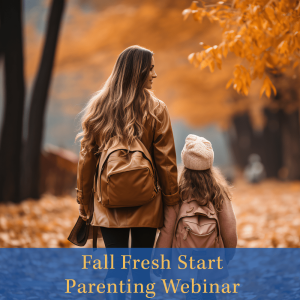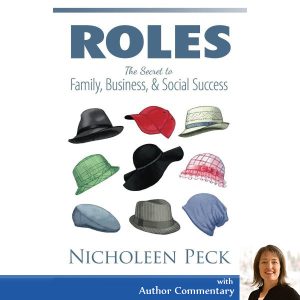Mindset Makes or Breaks Family Bonds
“My daughter is so ungrateful! All I do is serve her, but she doesn’t care about me or what I feel. And, she never helps out, even when I ask nicely,” an exasperated mother told me about her teenage daughter.
In a later conversation, Emily, the daughter said to me, “I never get anything my way. My mom controls everything. She pretty much treats me like a slave.”
On the surface, it could be easy to call the mother controlling or uncaring and suggest that she give in more to her daughter’s wishes. On the other hand, it’s tempting to see the mother as the victim of an unkind teenager who needs a lesson in respect. What might not be seen is that both mother and daughter in this circumstance are practicing destructive mindsets that will not only perpetuate their relationship problems but could also lead to other damaged relationships, as well. Family bonds lay the foundation for all of our bonds outside of the family unit, and each person’s mindset makes or breaks all those bonds.
It’s not really about what happens to us; it’s about how we process what happens. Both Emily and her mother want the other person to serve them. And, if they’re going to give service to each other, then they want to experience a personal benefit from the service. Looking for a personal benefit from service to another person is one of the most common mindset mistakes that breaks family bonds.
The Mindset That Breaks Bonds
The driving force behind so many family bonding problems is the question, “What do I get out of it?” Think of the last argument you took part in. Were you more concerned with how the other person felt and what they needed, or were you more concerned with what you wanted the other person to do for you to help you feel better or to understand you?
When a parent asks a child to come join them for a family activity and the child doesn’t want to, is that child thinking of what they want to get out of their time, or are they thinking about what others want, need, or require for good family bonds?
The “What do I get out of it?” mindset encourages us to feel selfish and entitled while also casting a pessimistic shadow over our choices. Seeking personal benefits from all of our actions is a mindset that disconnects relationships because the selfish focus stops us from seeing the other person as a person.
When we see our family members as a means to get stuff we want, then we are essentially objectifying the people we love in order to make things go our way. If our personal benefits become more important than the people, then the people cease to be people in our eyes. Instead, they are manipulatives that we hope to control.
The what-do-I-get-mindset starts small with wanting something for personal benefit. But, if left unchecked, it grows into a full-blown objectification mindset that sets people up as objects of little value. Once both people have an objectification/manipulation mindset, then proper family bonds will not form. Relationships form best through giving.
The Mindset That Makes Bonds
Mahatma Gandhi was one of the most beloved characters of the 20th century because of his principle-based wisdom, great leadership, and loving countenance. People of all classes came to see him, hear him, and be in his presence. Even if a person never met Gandhi in person, they felt bonded to him. Why?
Gandhi’s life was a great example of a mindset shift and a heart change, the hallmarks of a true leader. In his youth, he was somewhat spoiled by his mother, and even had bouts of anger. Early on, Gandhi wanted people to respect him, and not judge him for his racial differences. But, as time went on, and he engaged in serving his fellow men, he cared less and less about the accolades of people and gaining respect or equal treatment. Instead, he put his focus on changing himself to live according to principles and truths and serving alongside those he led.
Gandhi served without any thought of personal benefit after he experienced his own come-to-truth moment. It was at this time that Gandhi changed from being a popular, powerful figure, to a sage of wisdom and example to humble humanity.
What did Gandhi do?
- He went to the people.
- He understood the people.
- He taught the people.
- He spoke openly with the people by declaring principles and truths, even if the people didn’t like it.
- He worked alongside the people.
- He went back to the basics to find a connection with true humanity.
- He sacrificed personal time, comfort, and means for the good of the people.
- He served people for God because it was right.
- He found purpose in spreading goodness.
Ironically, but not surprisingly, this life of constant heart change and humility gained him the greatest respect from people of all races. My great-aunt, Evelyn Johnson, is a Gandhi figure in my life. She openly gives goodness, service, caring, and wisdom to all who know her. In her 80s, Aunt Evelyn doesn’t wait for people to do things for her; instead, she’s always the first to give service. She is happy, humble, sees the potential in others, expresses gratitude, and reaches out to people. She is beloved by all who know her. Everyone connected with her likely feels that she loves them best.
The Evelyn Johnson, Mahatma Gandhi, bonding model is really a mindset. It’s a way of seeing the world that leads to deep bonds and increased happiness, even though on the outside it could look like the harder road to take.
Bonding isn’t easy. It doesn’t happen passively. Creating good bonds with people takes deliberate effort and doesn’t usually come with the personal benefits that most people are looking for in their efforts. When we choose to have a selfless mindset shift toward loving service because we love the person we serve and want them to grow and succeed, then we draw our loved ones toward us.
Emily and her mother are stuck in a damaging mindset that will continue to break their family bonds, but all is not lost. Emily could choose to value the role of her mother as a teacher in her life, and her mother could choose to value Emily’s role of learner in her life. Seeing each other for who they really are will lead mother and daughter down a path of understanding and truth. As soon as a person acknowledges who another person is, then they see themselves more clearly and can more readily recognize the steps that they must take to be the best versions of themselves.
Join me March 11th, for 10 Habits For Building Better Family Bonds, so that you can create a world-changing family bonding environment that your children will always thank you for.
Index
- Adult Children, Adults, Age, Analyzing, Assertive Communication, Attitude, Behaviors, Boundaries, Calm, Changing Hearts, Character Building, Common Vision Creation, Connecting (Looking in the eyes), Correcting, Culture, Encouragement, Entitlement, Expectations, Family Culture, Family Unity, Grandparents, Group Problem Solving, Manipulation, Mutual Respect, Power Struggling, Pre-Teach, Priorities, Problem Solving, Relationships, Respect, Roles, Seek to Understand, Sibling Interactions, Skills, Social Skills, Spouse, Structure, Teens (Youth), Toddlers & Younger Children, Tone, Tweens, Work Ethic





